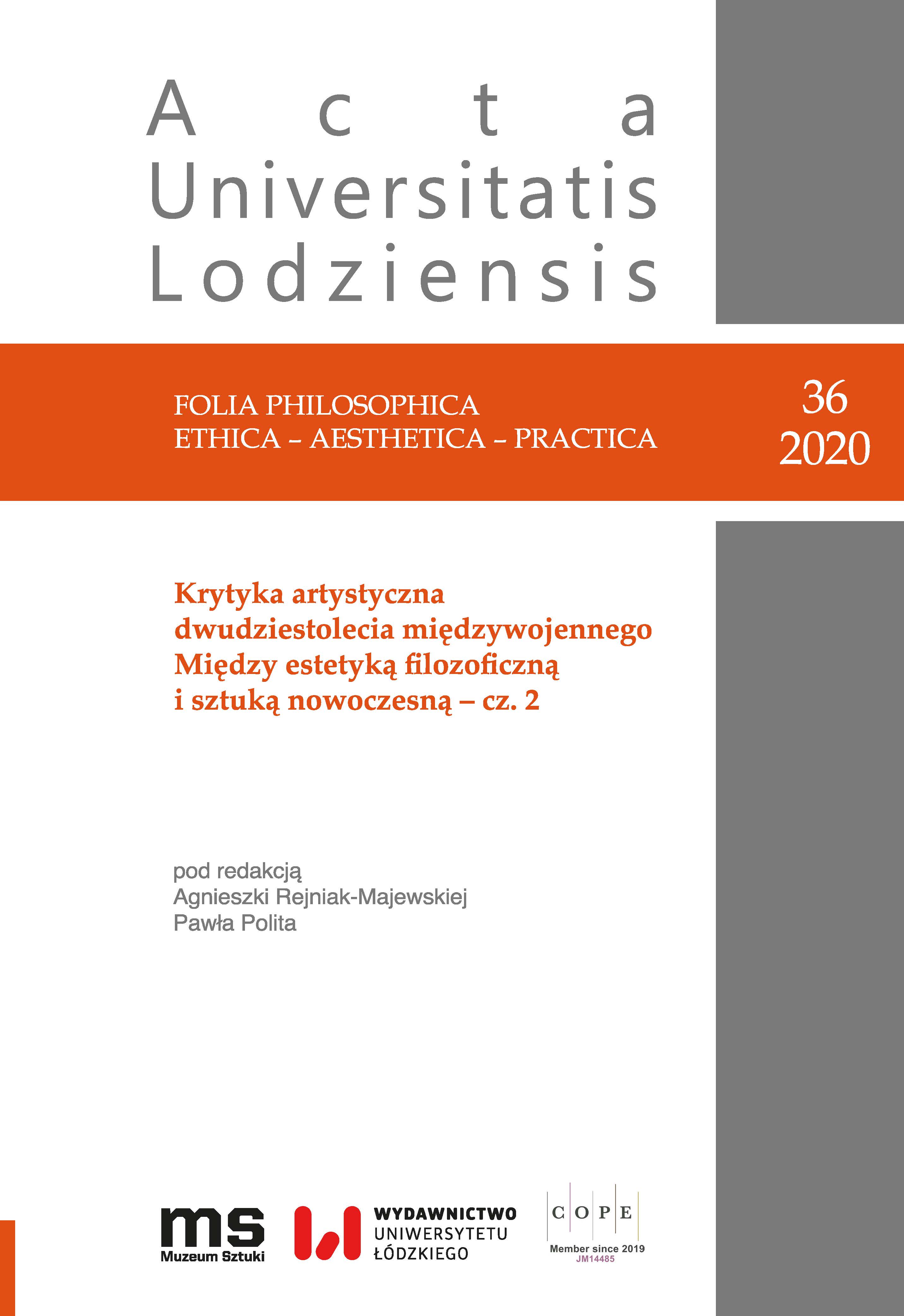In Search of the Inverted Time of Avant-Garde. An Aattempt to Read the Phenomenon of Debora Vogel in Light of the Modern Crisis of Experience
DOI:
https://doi.org/10.18778/0208-6107.36.04Keywords:
anticipations in art, avant-garde, neo-avant-garde, Nachträglichkeit, posthistoricism, temporality of aesthetic experience, spatiality of aesthetic experienceAbstract
This article considers the principles of Debora Vogel’s artistic project in the context of reflecting on the transformations of the late modern experience. Among the transformations, the one I consider key is the shift from narrative linearity to polyphonic simultaneity which is related to the displacement of temporal aspects of modern experience by spatial ones. The second context in which I consider Vogel’s work are transformations which took place in art as a consequence of the avant-garde – its signature concepts including simultaneousness, poliphony, breakdown of hierarchy, lack of a centre, event, uprootedness, blurring of boundaries between art and life. I claim that the full significance of the above-mentioned transformations becomes visible in neoavant- garde art. Following in the tracks of neo-avant-garde art, I bring out the shifts which appear to be important from the perspective of a necessity to return to Vogel as its anticipator. The method I adopt assumes a particular understanding of anticipation, according to which the beginning (avant-garde) is co-created by its continuation b(neo-avant-garde).
References
Berman Marshall, Wszystko, co stałe rozpływa się w powietrzu. Rzecz o doświadczeniu nowoczesności, tłum. Marcin Szuster, Towarzystwo Autorów i Wydawców Prac Naukowych Universitas, Kraków 2006.
Google Scholar
Bürger Peter, Teoria awangardy, przeł. Jadwiga Kita-Huber, Towarzystwo Autorów i Wydawców Prac Naukowych Universitas, Kraków 2006.
Google Scholar
Danto Arthur Coleman, Po końcu sztuki. Sztuka współczesna i zatarcie się granic tradycji, przeł. Mateusz Salwa, Towarzystwo Autorów i Wydawców Prac Naukowych Universitas, Kraków 2013.
Google Scholar
Didi-Huberman Georges, Przed obrazem. Pytanie o cele historii sztuki, przeł. Barbara Brzezicka, Wydawnictwo Słowo/Obraz Terytoria, Gdańsk 2011.
Google Scholar
Duchamp du signe, Textes réunis par Marc Sanouillet, Paris, Flammarion, Paris 1975.
Google Scholar
Foster Hal, Powrót realnego. Awangarda u schyłku wieku, przeł. Mateusz Borowski, Małgorzata Sugiera, Towarzystwo Autorów i Wydawców Prac Naukowych Universitas, Kraków 2010.
Google Scholar
Jay Martin, Pieśni doświadczenia. Nowoczesne amerykańskie i europejskie wariacje na uniwersalny temat, przeł. Agnieszka Rejniak-Majewska, Towarzystwo Autorów i Wydawców Prac Naukowych Universitas, Kraków 2008.
Google Scholar
Jimenez Marc, La critique. Crise de l`art ou consensus culturel?, Klincksieck, Paris 1995.
Google Scholar
Lyotard Jean-François, Les transformateurs Duchamp, Éditions Galilee, Paris 1977.
Google Scholar
Montaże. Debora Vogel i nowa legenda miasta, red. Andrij Bojarov, Paweł Polit, Karolina Szymaniak, wyd. Muzeum Sztuki w Łodzi, Łódź 2017.
Google Scholar
Rochlitz Rainer, Subversion et subvention. Art contemporain et argumentation esthétique, Paris, Gallimard, 1994.
Google Scholar
Schulze Gerhard, Die Erlebnisgesellschaft: Kultursoziologie der Gegenwart, Campus Verlag, Frankfurt 1992.
Google Scholar
Zeidler-Janiszewska Anna, Między melancholią a żałobą: estetyka wobec przemian w kulturze współczesnej, Wydawnictwo Instytutu Kultury, Warszawa 1996.
Google Scholar
Downloads
Published
How to Cite
Issue
Section
License

This work is licensed under a Creative Commons Attribution-NonCommercial-NoDerivatives 4.0 International License.












